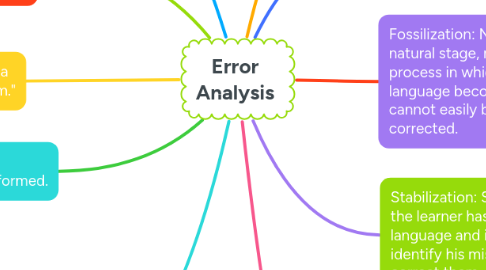
1. Mistake: Refers to an accidental confusion that cna be corrected because you know it is worng.
1.1. Example: "I writed an email to my friends." / "Mmm no it is I wrote an email to my friends."
2. Categories of Errors
2.1. Addition: Add extra words that should not be there.
2.1.1. Example: "She wrote an a incredible play."
2.2. Omission: Removing words that add order and grammatical meaning.
2.2.1. Example: "She my friend."
2.3. Substitution: Changing a word with another one with a similar meaning or pronunciation.
2.3.1. Example: Use of watch vs see "I see a new movie every Thrusday at home"
2.4. Ordering: Misuse of grammatical structures.
2.4.1. Example: "You is my friend best."
3. Covert: Errors superficially well-formed.
3.1. Example: "I was excited"
4. Error: Refers to something made out due to a lack of knowledge.
4.1. Example: The use of false cognates "attend vs assist"
5. Overt: Refers to a "deviation in form."
5.1. Example: "She runned all the day"
6. Intralingual: Faulty or partial learning of a language. Generalization.
6.1. Example: "She can swims."
7. Stabilization: Stage where the learner has mastered the language and is able to identify his mistakes to correct them.
7.1. Example: "We does not like... No, we don't like pineapple."
8. Categories of error treatment/types of feedback
8.1. Recast: interlocutor will repeat the error back to the learner in a corrected form.
8.1.1. Example: St: "I don't wash TV at night." T: "Oh! You don't watch TV at night."
8.2. Clarification Request: T identifies the mistakes and asks for clarification.
8.2.1. Example: St: "My best friend is Rusia." T: "Can you explain that to me?"
8.3. Meta-linguistic feedback: provides more context, tips, or information to correct the mistake.
8.3.1. Example: St:"We goed to the party." T: "Good. Is go a regular verb? Which is the simple past tense rule with irregular verbs?"
8.4. Elicitation: helps the learner to self-correct.
8.4.1. Example: St: "I went to the peach last weekend." T: "Was that a b or a p?" St: "It was a b, I went to the beach last weekend."
8.5. Explicit correction: T tells the st what to correct on the spot.
8.5.1. Example: St"They is my friend." T: "He is my friend. Remember to be careful with the third-person conjugation. Can you repeat that for me?"
8.6. Repetition: T repeats what the learner said, but in a correct way adding a change in intonation, so he/she notices the mistake.
8.6.1. Example: St: Tree o'clock. T: "Three o'clock."
